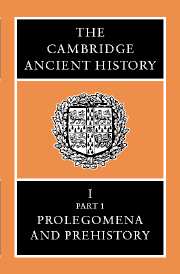Book contents
- Frontmatter
- Contents
- List of Maps
- List of Tables
- List of Text-figures
- Preface
- Chapter I The Geological Ages
- Chapter II Physical Conditions in Eastern Europe, Western Asia and Egypt Before the Period of Agricultural and Urban Settlement
- Chapter III Primitive Man in Egypt, Western Asia and Europe in Palaeolithic Times
- Chapter IV The Evidence of Language
- Chapter V The Earliest Populations of Man in Europe, Western Asia and Northern Africa
- Chapter VI Chronology
- Chapter VII (a) The Earliest Settlements in Western Asia from the Ninth to the End of the Fifth Millennium B.C.
- Chapter VII (b) Anatolia Before 4000 B.C.
- Chapter VIII The Development of Cities From Al-‘Ubaid to the End of Uruk 5
- Chapter IX (a) Predynastic Egypt
- Chapter IX (b) Palestine During the Neolithic and Chalcolithic Periods
- Chapter IX (c) Cyprus in the Neolithic and Chalcolithic Periods
- Chapter X The Stone Age in the Aegean
- Bibliographies
- Index to Maps
- General Index
- Maps
Chapter VI - Chronology
Published online by Cambridge University Press: 28 March 2008
- Frontmatter
- Contents
- List of Maps
- List of Tables
- List of Text-figures
- Preface
- Chapter I The Geological Ages
- Chapter II Physical Conditions in Eastern Europe, Western Asia and Egypt Before the Period of Agricultural and Urban Settlement
- Chapter III Primitive Man in Egypt, Western Asia and Europe in Palaeolithic Times
- Chapter IV The Evidence of Language
- Chapter V The Earliest Populations of Man in Europe, Western Asia and Northern Africa
- Chapter VI Chronology
- Chapter VII (a) The Earliest Settlements in Western Asia from the Ninth to the End of the Fifth Millennium B.C.
- Chapter VII (b) Anatolia Before 4000 B.C.
- Chapter VIII The Development of Cities From Al-‘Ubaid to the End of Uruk 5
- Chapter IX (a) Predynastic Egypt
- Chapter IX (b) Palestine During the Neolithic and Chalcolithic Periods
- Chapter IX (c) Cyprus in the Neolithic and Chalcolithic Periods
- Chapter X The Stone Age in the Aegean
- Bibliographies
- Index to Maps
- General Index
- Maps
Summary
I. EGYPT—TO END OF TWENTIETH DYNASTY
The most significant advance made in the study of ancient Egyptian chronology in recent years is the repudiation by Neugebauer and others of an astronomical origin for the Egyptian civil calendar and, as a corollary, the elimination of the socalled Sothic Cycle as a factor in dating the earliest periods of Egyptian history. It is thus unnecessary to associate the inauguration of the calendar, and all that is implied therein, with the beginning of such a cycle in 4241 B.C.; the beginning of Egyptian history may now be lowered to about the end of the fourth millennium B.C, a date which agrees far better with the body of historical and chronological evidence available than do the much higher figures once favoured by some leading scholars. It does not, however, entitle us to disregard this evidence and arbitrarily telescope the earlier periods of Egyptian history to allow for synchronisms with the admittedly fluid chronologies of neighbouring lands or merely to gratify an intuitive feeling that such eras as the Early Dynastic Period and the Old Kingdom ‘ could not’ have been as long as our ancient sources indicate that they were.
For the fixing in time of the Egyptian Middle Kingdom and the periods preceding it the key date is the seventh year of the reign of King Sesostris III of the Twelfth Dynasty. In this year a heliacal rising of the star Sothis (our Sirius) was recorded on 16. VIII of the 365-day civil calendar, a fact which, thanks to the regular displacement of this calendar in relation to the true astronomical year, allows the year in question to be placed between 1876 and 1864 B.C., with every probability favouring 1872 B.C. Since the reigns of Sesostris III’s predecessors of the Twelfth Dynasty amount to a total of 120 years, and since the Turin Canon of Kings (confirmed in part by surviving monuments of the time) gives 143 years as the duration of the Eleventh Dynasty, it is possible, with only a negligible margin of error, to date the founding of this dynasty to 2133 B.C.
- Type
- Chapter
- Information
- The Cambridge Ancient History , pp. 173 - 247Publisher: Cambridge University PressPrint publication year: 1970

